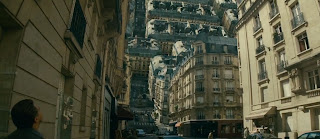Ramona and Beezus has been receiving very little attention thus far, despite the fact that it's an adaptation of a popular nostalgic book series (a fact I didn't realize until halfway into the movie, indicating this film's poor marketing) and stars many recognizable actors and actresses, some of whom I would even be willing to say are talented. You'd think a book like this would be marketed like all hell: a family friendly, star filled, feel good, simple love fest with an established fan base. Translated into "producer-ese," that essentially says "easy money." And yet, while there have been ads of course, said ads don't seem all that concerned with really selling there movie.
James Cameron once related how he received negative reactions towards a trailer for Avatar that showcased the visuals and much more positive reactions when a trailer was released that revealed something of the story. Thus we can see that even films that are, shall we say, not all that story focused can look better when something of their story is revealed. Because of what an audience expects from a trailer, what is revealed to them of the plot will register in their minds as a sample, so no matter how big or involving the actual story is, the audience will assume it is several times whatever they see in the trailer, even if the trailer may as well have revealed the whole movie. The trailers for Ramona have declared the film to contain "adventure run wild," and other such vague descriptions, yet while it showcases some of its cute set pieces, just about nothing is revealed of the actual story. Why? Well, just as the trailer for The Curious Case of Benjamen Button contained about as much story as the feature length movie, the desire amongst the powers that be to remain tight lipped about Ramona's story indicates that there simply isn't much to tell.
Ramona succeeds in what was possibly its only goal, specifically being cute. The hi jinx, the child logic, and most importantly the lead child actress are all undeniably adorable. The problem is that you can't just watch adorable for over an hour. Cute is an emotional concept, a form of pathos that can serve as, if you will, the fuel for a movie. But the fuel has to be running something or else it's just a fire sitting there waiting to fizzle out, and for all its flame, the Ramona train barely budges an inch from the station. Unlike many of the legendarily awful movies of Ramona's niche (movies like Teen Witch, Spice World, Babysitter's Club, and of course Bratz) it actually attempts to have some semblance of conflict in its story, specifically that Ramona's happy (yet oh so delightfully quirky and not in anyway at all bland) family is being impacted by her father's lost job, which creates the looming threat of them possibly having to move out of their beloved house. While this attempted conflict is appreciated, it is weakened by the absense of an antagonist (the closest thing there is is a bitchy classmate of Ramona, but said child has no impact what so ever on the plot) and especially by the fact that nothing Ramona does has any influence on the out come. This is truly the great conundrum facing writers of fiction that involves kids: when a character is too young to understand or much less deal with any of the situations around them, this can provide some opportunities for irony, but really destroys any sense of tension as we watch all the world's problems magically fix themselves around our main character's good natured tomfollery.
Ramona and Beezus is a very pointless movie, pointless in that there seems to be no reason for it to exist, pointless in that there is no attempt to really penetrate its audience and strike at the heart, and pointless in that it is childproofed; soft, dumb, and harmless. Nothing about it is offensively awful in any way, but when Toy Story 3 is still playing, there's really no reason to bother with it. You won't be suffering if your kids beg you to see it, but there's better things they and you could be doing.








